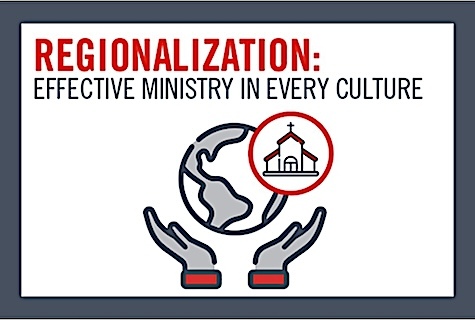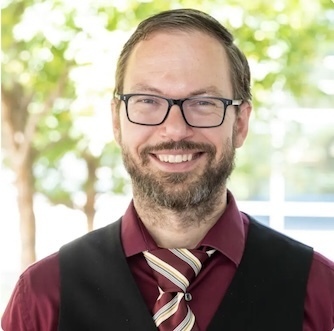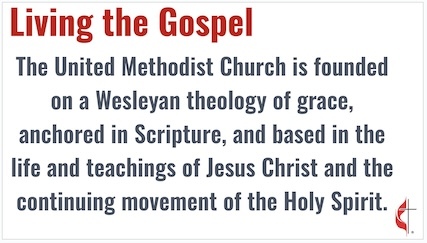
Annual Conference Legislation: Worldwide Regionalization

At this year’s session of the Dakotas Annual Conference, one business item on the agenda is voting on constitutional amendments that were passed by the General Conference in 2024. In order to become church law, constitutional amendments must be passed by at least 2/3 of General Conference. This step has already occurred. Now, the amendments must be ratified by annual conferences. Amendments must be supported by 2/3 of the total voting members of all the annual conferences combined.
One set of legislation to be ratified is related to Worldwide Regionalization. Worldwide Regionalization represents an organizational vision designed to enhance adaptive evangelism, emphasize our denomination's global nature and strengthen our connection by prioritizing our mission and ministry. This strategic plan was developed collaboratively by United Methodists around the globe and adopted by 78% of the General Conference delegates last year.
Why Regionalization?
The intent of regionalization is to allow United Methodists to best serve their unique communities. This is done through a restructuring that allows for contextualization while maintaining connectionalism.
“The doctrine of the Incarnation (John 1:14) reminds us that God meets people where they are. Just as Jesus became fully present (incarnate) in a specific culture and in a specific time in human history - in every age, the church must adapt to be relevant,” said Bishop Lanette Plambeck, resident bishop of the Dakotas-Minnesota Area. “Regionalization allows for theological expressions and governance that reflect the lived experiences of different regions while maintaining shared core doctrines.”
At a recent informational webinar, Dr. David W. Scott, the Senior Director of Theology and Strategic Planning for the General Boards of Global Ministries and Higher Education and Ministry, shared some of the problems regionalization seeks to address, the connectional values that undergird it, and the theological grounding for regionalization.

Dr. David W. Scott
Dr. Scott began his presentation by naming the reality that the United Methodist Church is, in many ways, U.S.-centric. Evidence of this is seen in the disproportional number of General Conference petitions as well as Judicial Council cases that that come from the U.S. versus elsewhere. The denomination operates according to rules developed in the United States and the U.S. is often proportionally overrepresented on denomination-wide boards despite the work of those agencies being worldwide in nature.
While Dr. Scott could point to some of the historical roots that led to this U.S. centrism, the more important point is the set of problems it creates. The inequality hurts Christian fellowship and mutuality that is vital for a healthy church. It uses the U.S. as a template for the rest of the Church in ways that don’t fit regions with different laws, access to resources and cultural norms. It also hinders evangelistic efforts if we can’t adapt to different contexts.
Dr. Scott did, however, share hope for how worldwide regionalization might help us overcome these challenges and support a healthier and holier connectionalism.
“As we think about what sort of connectionalism God is calling the United Methodist Church to embody, we need to be aware of the different senses in which the term can be understood,” Dr. Scott explained. “This includes a structural meaning of connectionalism, where we talk about the formal polity of the denomination, its conferences, episcopal leadership, itineration, the agencies, and so on. Connectionalism is also a set of relationships between people who know one another and have prayed, worked, talked, and traveled with one another.”
He continued, “But there's even more. As Christians, we believe that we are sisters and brothers in Christ whether or not we have ever met. This is a spiritual sense of connectionalism.”
“Finally, connectionalism has an ecclesiological sense,” shared Dr. Scott. “There's something important about the nature of the church that only exists in the connections between local congregations. Congregations need one another to fully be the body of Christ.”
He challenged United Methodist leaders to think about the ways in which we can strive for a connectionalism that is missional, mutual, decolonial, contextual, intercultural, and open. “Regionalization is just one way— but an important way—to move away from U.S. centrism and toward the type of connectional values that God is calling us to practice,” shared Dr. Scott.
This concept of regionalization is not entirely new. One form of regionalization that already exists in UMC polity is that of the annual conferences, referred to in the Book of Discipline as “the fundamental bodies of the Church” (¶ 12, Article IV 2020/2024 BOD.) They bring together churches from across a region for collective decision-making in a way that goes beyond the local church but does not include everyone from the global church.
The worldwide regionalization legislation proposes to rename existing central conferences as regional conferences, and to create a new U.S. Regional Conference. Central conferences are an already-existing form of regionalization. The worldwide regionalization legislation would standardize this form of regionalization to include the United States, which currently does not have an equivalent form of regionalization to the central conferences. This will create equity across the Church without privileging one region as the center and others as peripheries.
“A regionalized structure allows the UMC to respond to local needs, cultural shifts, and social realities while focusing on disciple-making,” shared Bishop Lanette.

Once created, each regional conference will have the authority to maximize the effectiveness of its mission and ministry in its context by adapting portions of the Book of Discipline. All regional conferences will share the same Constitution, Doctrinal Standards and Theological Task, The Ministry of All Christians, and Social Principles.
This restructuring does not change United Methodist beliefs including, but not limited to, the beliefs outlined in the Apostle’s Creed such as the Triune God — Father, Son and Holy Spirit, the virgin birth and full divinity of Christ, Jesus’ resurrection and ascension, in the continuing movement of the Holy Spirit and the bodily resurrection. It does not change the United Methodist belief that the Bible “contains all things necessary for salvation.”
Worldwide regionalization would also maintain The Council of Bishops, Judicial Council, General Agencies, and General Conference. However, the way the General Conference would be able to function and steward resources could adapt to be more efficient and effective.
Dr. Scott went on to outline four affirmations about regionalization as the theological principle.
- Regionalization has a Biblical foundation – Throughout scripture we see God recognize the diversity of cultures and nations. God's salvific vision includes all nations and intends for them to keep their own unique culture or cultures as part of that vision. Additionally, there was a spiritual and relational unity among the churches, along with local and regional decision-making by leaders of churches and groups of churches throughout the Greco-Roman, Persian and African lands.
- Regionalization is missional – The emphasis on contextualization in mission theology recognizes that no culture can claim superiority over other cultures in the Christian faith just as no region can claim superiority over others. Insisting that all Christians follow the practices of one culture/region hinders the Gospel. When Christianity adapts to the culture of various nations and lands, it flourishes. Regional governance supports the church in efforts to engage with the culture around it in appropriate ways.
- Regionalization is equitable – It moves from treating one region (the U.S.) as the center and template for others and fosters a greater sense of mutuality grounded in equity, reciprocity, and trust.
- That regionalization is connectional – Together, United Methodists across nations and cultures can discern how to support one another in carrying out, in our own contexts, our shared mission of making disciples of Jesus Christ for the transformation of the world.
Dr. Scott concluded his presentation with a reminder that we find ourselves in a Kairos moment – Kairos, meaning “God’s appointed time.”
“Our current Kairos time is the latest in a long line of Kairos moments throughout the history of the denomination, as we seek to respond to God's invitation to live into new and more equitable ways of being the connectional church together across geographic borders,” emphasized Scott.
To Learn more about worldwide regionalization, check out ResourceUMC.org/regionalization.